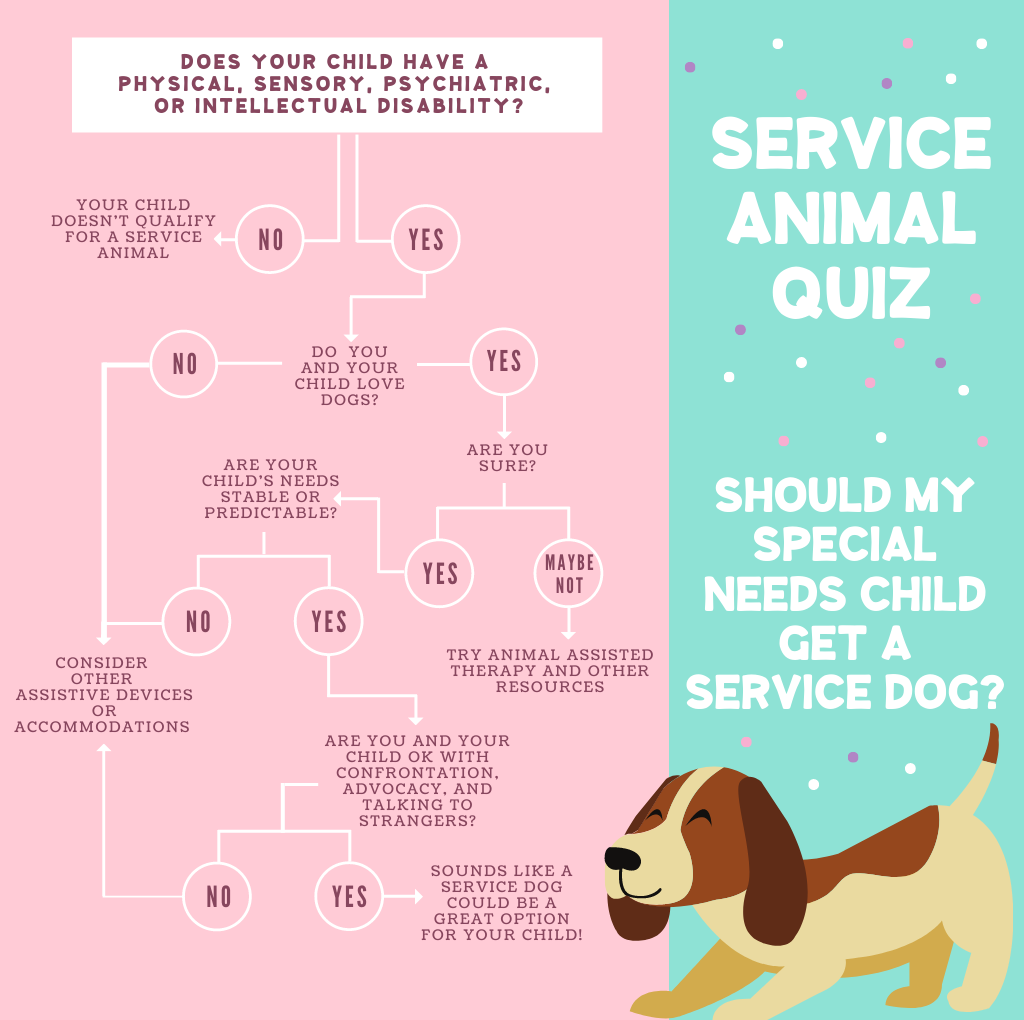To help my clients (and you!) to navigate this question, I’ve created this quiz. Because a service animal doesn’t just need to help your child. It also needs to be a good fit for your family.
But first: What’s the difference between a service animal and an emotional support animal?
You may have heard of emotional support animals. How are they different from service animals?
A service animal is any dog that is individually trained to do work or perform tasks for the benefit of a person with a disability.
The disability might be physical, sensory, psychiatric, or intellectual. Tasks performed can include, for example:
- pulling a wheelchair
- retrieving dropped items
- alerting a person to a sound
- reminding a person to take medication
- pressing an elevator button
The Americans with Disabilities Act (ADA) protects service animals. This allows them access to restaurants, hospitals, stores, and other places that pets can’t go.
You can think of a service animal like a medical device, such as a wheelchair or oxygen tank. Unless its unsafe for the dog to be in a certain environment, it must be allowed access. So, your service dog can go with you to eat in any restaurant. But, it probably won’t be allowed in the food preparation area like the kitchen. Likewise, your dog can go with you on a visit to the zoo. But your pup will probably be prohibited from going near prey animals such as lions or bears, who might be tempted to stalk your dog.
Emotional support animals are companion animals that provide therapeutic contact to an individual.
They are not service animals and are not protected by the ADA. Service animals are trained to perform specific tasks. Emotional support animals, on the other hand, receive no specific training.
Any animal that provides support, well-being, or comfort to an individual through companionship and affection may be regarded as an emotional support animal.
In the US, emotional support animals are exempted from certain rules against having animals in most housing and travel situations.
Now that you know the difference between a service dog and an emotional support animal, you’re ready for the quiz.

Quiz: Should I get a service animal for my special needs child

1. Does your child have a physical, sensory, psychiatric, or intellectual disability?
Having one or more of these types of disabilities is the basic requirement for having a service dog. If your answer to this question is no, then your child does not have a need for a service dog. If your answer is yes, move on to the next question.
2. Do you and your child LOVE dogs?
For a service animal to benefit your child, the dog will need to be with your child at all times. At school, in their room at night, if they go to the hospital, on vacation, etc. You and your child must both love dogs enough to have one with you 24/7. If you don’t, you should consider alternative options to meet your child’s needs. If your answer is yes, move on to the next question.
3. But do you REALLY love dogs?
In addition to having a dog with you all the time, getting a service dog means committing to ongoing training for the life of the dog. In an article for TONIC last year, I shared the story of a former client who had a service dog. Their disability progressively worsened, and they were unable to care for and train their. Over time, the dog, who was trained to love working, became destructive and disorderly from lack of purpose. Sadly, the dog ultimately had to be retired from service work.
What should you do if you realize that you can make this commitment to engaging a dog in ongoing training? In addition to considering alternative support devices, you may want to consider if some other type of animal interaction might benefit your child. You might consider an animal assisted therapy. This might be meeting with a therapist who uses a dog in their practice. Or perhaps your child might enjoy participating in therapeutic horseback riding or equine assisted therapy. If your answer is yes, move on to the next question.
4. Are your child’s needs because of their disability relatively stable? OR is their expected progression of disability very well understood?
A service animal will be specially trained to perform specific tasks to assist your child. If your child’s needs change greatly over time, the dog may no longer be able to meet their needs. Or, it may require expensive and time-consuming retraining to accommodate new task needs.
Consider if an assistive device or other accommodation might make more sense to address your child’s needs as they age and grow.
For instance, suppose your child has diabetes. We have a reasonable understanding of what kind of service dog may help them most. This would be a small dog, who your child can carry in a chest pack. The dog’s job will be to smell changes in your child’s blood sugar in their breath, and to alert your child of any dangerous changes. It’s unlikely that any other tasks will be required of this dog based on your child’s disability and age.
But what if your child has a rarer or lesser understood genetic disorder, or if their psychiatric and emotional needs are in flux? It may be harder to identify specifically which tasks a service dog should be trained to do to benefit them. It may be easier to create a coping skills toolkit from whatever products or services meet your child’s needs in the moment.
Readjusting a dog’s task training may take more time and effort than you are able to give if your child’s needs aren’t predictable or well understood. If your answer is yes, move on to the next question.
5. Are you and your child comfy with being in the spotlight? With self-advocacy? How about handling confrontation and awkward conversation?
If your answer to this question is no, do not get a service dog for your special needs child.
Having a service dog makes your child a target for scrutiny from those who think your child is faking. You’ll also be engaged by others who are simply curious and conversational and want to hear all about your child’s dog, or tell you all about theirs. People will feel comfortable invading your child’s privacy by asking very personal questions, simply because they have a dog. You will at some point have to assert your right to have a service dog in a public space.
Do not get a service dog unless you are OK with this level and type of interaction with strangers.
As one client once said “I can no longer make a quick and painless trip to the grocery store. I feel the weight of others’ eyes on me constantly. Some think that my dog is a fake and that I am selfish. Others put their own needs ahead of my own, and try to ‘make eyes’ with my dog. They don’t realize that my dog is essential for my safety, and that disrupting her from her job could be life threatening for me.”
But, if you:
- Have answered yes to every other question on the quiz, AND
- you are comfortable with asserting your child’s right to have a service animal, AND
- you can maintain boundaries with those who try to invade your child’s privacy
then a service dog could be a good fit for your child and your family!
So, you’ve decided to get a service animal for your special needs child. Now what?
Check with a group like ADI international to learn more about the next steps to take to find the right dog to help your child.
I also highly recommend that you read the ADA’s Frequently Asked Questions about Service Dogs. There is a lot of helpful information for prospective handlers in this resource.
I hope that this quiz has been helpful as you consider the question “Should I get a service animal for my special needs child?”












